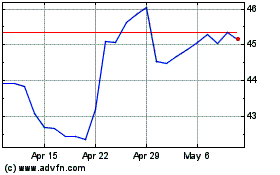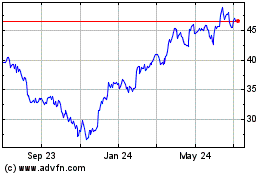By Alexandra Bruell
NBC said it set a record for national advertising sales in this
year's Winter Olympics, even as some of the biggest spenders of
recent years are pulling back at the 2018 Games.
Big Olympic advertisers including General Motors Co., Procter
& Gamble Co. and AT&T Inc. are expected to spend less on
this year's Games than they did in 2014, according to people
familiar with the situation.
Ad buyers attribute the cuts to a number of factors. Some
advertisers are moving away from big, expensive events in favor of
more targeted media and digital platforms. Others are concerned
about viewership for the Games, because of changes in consumers'
media-consumption habits and less buzz around the winter edition
than the summer Games.
An NBC Sports spokesman said in a statement the network will
have national TV and digital ad sales of over $900 million from the
Pyeongchang Games with roughly 60% from new advertisers, "a sign
that the Olympic movement remains of great interest."
"As the U.S. rights holder through 2032, building a diverse
group of relationships is a long-term benefit," the statement
said.
Still, the cuts by stalwart Olympics advertisers raise questions
about whether their concerns could resonate with other brands in
the future.
The weeks-long, live sporting event on Comcast Corp.'s NBC
kicked off on Thursday from Pyeongchang, South Korea.
Consumer products giant P&G and telecom provider AT&T
are both expected to trim their Olympic ad spending by at least 30%
compared to their outlays during the last event in Sochi, Russia,
the people familiar with the situation said. Both companies had
increased their ad spending substantially in the previous two
Winter Olympics cycles.
P&G, which spent $51 million on U.S. TV ads in the 2014
Games, said it has found more "efficient and effective" ways to
spend through the Olympics. "As a top sponsor since 2012, we have
found ways in every Olympics to get more efficient and effective in
building our brands across all consumer touch points including in
digital, e-commerce, TV and in-store," said a P&G
spokeswoman.
General Motors, which spent $148 million in the 2014 event, is
also planning on spending roughly 10% less this year, said a person
close to the business. GM's Olympics shift is part a broader
strategy to cut back on big, expensive events, according to people
familiar with the matter.
GM, P&G and AT&T were the top three TV ad spenders in
the U.S. during the 2014 Games, according to WPP-owned ad-tracking
firm Kantar Media.
People close to Coca-Cola say the beverage giant also
anticipates spending less in this year's Games.
"We think overall advertising demand for the Olympics is
somewhat less than we had initially expected, for both local and
national," said John Janedis, an analyst at Jefferies.
In Sochi, the network generated $1.1 billion in revenue,
according to financial results reported by NBC-parent Comcast Corp.
An NBC spokesman said that figure included national and local ad
sales, plus other revenue. The $900 million-plus figure for this
year does not include local sales, he said. The spokesman declined
to provide apples-to-apples figures for the two years, but said
national ad sales for the Sochi event were more than $800 million.
He also said the network is still booking business.
The Olympics is one of the few live events through which
advertisers can reach large audiences globally, but it faces a
number of hurdles. The live sports arena has grown cluttered with
more games and events for advertisers to choose from, especially
with a number of big events this year, including the World Cup,
Olympics and Super Bowl.
The Games are also subject to the same pressures happening more
broadly in the TV industry, as more people migrate from traditional
cable and broadcast TV to digital services.
Some advertisers can reduce ad spending simply because the
dynamics of their industry have changed, or they were launching a
big product one year but aren't the next. GM cut its ad spending
dramatically in the 2010 Winter Games, when the auto industry was
still recovering from the recession.
BMW, which was a sponsor in Sochi, is cutting back since it
ceded its sponsorship role to Toyota, according to people familiar
with the matter.
NBC has asked advertisers to commit to multimillion-dollar
Olympics ad packages, as well as to spending on other NBCUniversal
properties. Thirty-second ad units in popular Olympic primetime
slots cost between $700 and $750 million, according to ad
buyers.
"It's an expensive property. In order to make an impact, you
have to spend a lot," said one ad buyer. "This year is a
specifically huge year, between the World Cup, Olympics and just
the natural sports landscape. Advertisers have to make
decisions."
New spenders have come in with "significant money," said another
buyer.
It helps NBC that it is guaranteeing advertisers that it will
reach viewers based on a metric that includes all people over the
age of two watching live across all platforms, such as traditional
TV and online streaming. That's new for the Winter Olympics.
Previously, the network guaranteed audience reach based on a
certain number of households that tune in. "That alleviates some
pressure and allows them to sell more," said the buyer.
Contributing: Suzanne Vranica
Write to Alexandra Bruell at alexandra.bruell@wsj.com
(END) Dow Jones Newswires
February 09, 2018 18:10 ET (23:10 GMT)
Copyright (c) 2018 Dow Jones & Company, Inc.
General Motors (NYSE:GM)
Historical Stock Chart
From Mar 2024 to Apr 2024

General Motors (NYSE:GM)
Historical Stock Chart
From Apr 2023 to Apr 2024
